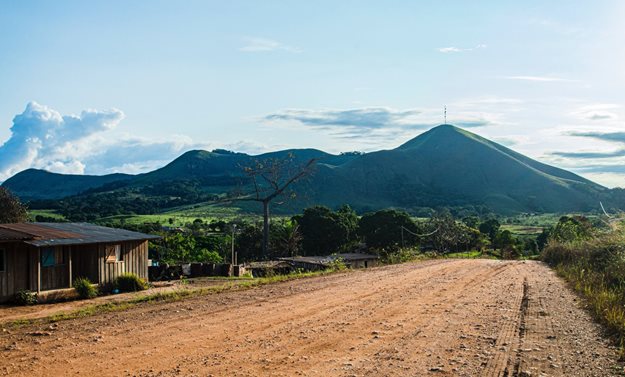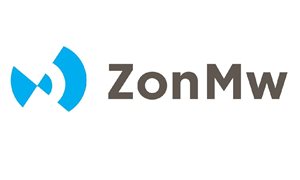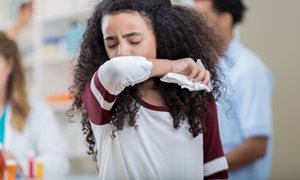
After many prolific years at the University of Tübingen, Prof. Benjamin Mordmüller has started his new position at Radboudumc in October 2020. His research focuses on tropical diseases, particularly malaria. With his expertise in vaccine development and human clinical trials, he is already hard at work at the Department of Medical Microbiology. Let’s take a closer look at his research and the man behind it.
Where are you from?
I was born in Bremen, Germany. My mother is a pharmacist, my father a painter, and my brother an architect. My wife is also a medical scientist, and my son will finish school this year. Both are still in Tübingen. I often miss them.
Where do you live right now?
Since October, I live in the center of Nijmegen in an apartment of a friend who works for the French development organization in Bénin. We met for the first time almost three decades ago in a small pop-up bar in Adouma, a quarter of Lambaréné in Gabon. I was a medical student doing research for my MD thesis; he worked at a research institution in Franceville. Since that time, my sometimes twisting path has straddled the border between basic and applied research to improve health, particularly in Africa.
What is your professional background?
I am not sure – maybe a clinician-scientist or a scientist with an interest in clinical problems or an MD that attempts to do science?
What is your research about?
Following medical school in Berlin, I specialized in vaccinology and tropical medicine. Besides that, I studied statistics and spent a few years as a postdoc in a biochemistry laboratory in Berlin.
What is it that you ultimately want to discover?
To discover a way to make malaria vaccines work where they are most needed would make me happy.
My primary motivation is to contribute to the discovery and development of better therapies. My principal technique is clinical trials. Currently, I am fascinated by what drives the interplay between microbes and humans. I’m also interested in how are treatment costs distributed over time and in changing environments. It is interesting to think beyond the parasitism–mutualism model since it does not perform very well, at least not in medicine.
What drove you into science early in life? What were your motivations?
Until my last years in school, I had no idea what to do as an occupation. Medicine was a choice of opportunity (I passed the entry test) and a good way to continue school – learning a lot but reflecting only little. Nevertheless, it was then and during my research time in Gabon, where I recognized that science is my fate.

What brought you here after 18 years in your previous institute?
For a malaria researcher in Europe, Nijmegen is an epicenter. No other place covers the full lifecycle of the most important human parasite in the laboratory like we do.
I came during an exceptional time – the SARS-CoV-2 pandemic – from a department that is heavily engaged in COVID-19 research. And I brought an EU-funded project on a new SARS-CoV-2 vaccine with me. It is based on my long-lasting collaboration with the University of Copenhagen to develop malaria vaccines. We just got approval for the first human trial and you can volunteer as a participant. The vaccine technology we use was developed to improve malaria vaccines but can also be applied to any other antigen.
You have been working here for a few months already. How did you find them? What did you especially like so far, and are there things you still need to get used to?
The team is great, and I have already had many, very stimulating meetings and conversations on future projects with colleagues from all over Radboudumc and Radboud University. Upon arrival, I immediately got into the typical work of a clinical scientist: writing protocols and grants, designing studies, communicating with ethics committees and regulatory authorities. This also involves a lot of problem-solving and creative thinking, similar to my previous work but with a new flavor.
My biggest hurdle is to learn Dutch as fast as I would like. With social contacts nearly completely shut down, pretty much only my passive language skills improve.
You’ve started your new position during the pandemic. How did it affect your transition?
The pandemic has made my life very difficult. I can visit my family only sporadically, some members of the new team I have never seen in person and it is very difficult to get to know new people through online meetings only. No coffee breaks, no social interactions… We are looking for new staff members and can provide wonderful research opportunities. Nevertheless, only very few apply. I have never experienced this – although it is understandable that people do not think too much on relocating and starting new endeavors during these times.
How was/is your research affected by the pandemic?
Since January 2020, SARS-CoV-2 takes up at least half of my research time. In the beginning, it was mostly clinical work, the setup of clinical trials, and grant writing. Following my arrival at Radboudumc, I also started more scientific work, and since today, the COUGH-1 trial is up and running (see the link above).
What do you like to do during your spare time? Do you have any hobbies or are you doing any sports?
Music is very important for me, and it is a pity that it is so difficult to play and hear music at the moment. I play online or sometimes as part of a duo, but this has many limitations. Most people I used to play with live far from Nijmegen. Fortunately, a friend from school times lives close to Rotterdam, she plays bass, and we already managed to play a few times. My instruments are electric bass and traverso (a wooden type of transverse flute). I also like moving around (running, biking, swimming, walking).
If you could choose one book or movie to recommend, what would it be?
The question on books is not easy since my Dutch is still bad and reading is such a personal thing (e.g., I never read or watch police stories – I find them very disturbing). The last three books that impressed me are: Maxim Gorki “Autobiographische Romane”, David Rousset “L’Univers concentrationnaire”, and Chinua Achebe “Things fall apart”.
If you could choose a headline for a newspaper article about your current work, what would it be?
Malaria beats COVID-19.
Is there anything about your arrival/contributions at Radboudumc that may be highlighted in the media?
I hope that we will be successful with our research and further increase Radboudumc’s international visibility and impact, particularly in Africa. My work at the interface between basic and applied science, as well as between Europe and Africa, could be worth noticing.
Interview by Özlem Bulut
Related news items

Joint research in regional hospitals New research projects from promotion fund
22 November 2022Four research projects have been honored in the promotion fund of the Radboudumc and four regional hospitals. The research projects, which are a collaboration between CWZ, Jeroen Bosch Hospital, Rijnstate, Sint Maartenskliniek and the Radboudumc will receive a contribution of 240,000 euros.
go to page
Trained immunity’s role in kidney disease
17 November 2022Researcher(s) Jordi Ochando of the Icahn School of Medicine at Mount Sinai in New York and Raphaël Duivenvoorden of the Department of Nephrology at Radboudumc explain how trained immunity can have detrimental effects in kidney disease and transplantation.
go to page


